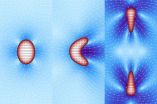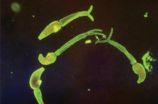(Press-News.org) The 2011 Fukushima nuclear disaster made the dangers of radiation all too real. To avoid similar tragedies in the future, scientists are working to develop new radiation-proof materials for nuclear power plants, as well as for less obvious applications such as medical devices and airplanes. An article in Chemical & Engineering News (C&EN), the American Chemical Society's weekly news magazine, explores the latest developments.
Jyllian Kemsley, a senior editor at C&EN, points out that radiation can cause a range of problems from temperature misreadings in electronic devices to nuclear power plant explosions. But scientists might be able to solve these problems by finding the right materials to deal with high-radiation environments. At the Fukushima power plant, for example, in a series of reactions, steam interacted with a zirconium alloy and released hydrogen gas, which led to the explosion. The zirconium alloy technology had come from a nuclear submarine design, but after the tragic failure in Japan, engineers would like to replace the material in above-ground reactors with something that is more robust.
Scientists are exploring a wide range of materials from steel to carbon nanotubes to see which ones can handle radiation with little to no effect, or even become stronger or better suited for a particular use when exposed, the article notes. In the case of nuclear power plants, scientists are finding that steel might be a better metal than zirconium for housing fuel pellets. For other applications, in an interesting twist, scientists have found that although radiation punches holes in carbon nanotubes, when they're bundled together, radiation can make the material 100 times more rigid.
INFORMATION:
The American Chemical Society is a nonprofit organization chartered by the U.S. Congress. With more than 161,000 members, ACS is the world's largest scientific society and a global leader in providing access to chemistry-related research through its multiple databases, peer-reviewed journals and scientific conferences. Its main offices are in Washington, D.C., and Columbus, Ohio.
To automatically receive news releases from the American Chemical Society, contact newsroom@acs.org.
Follow us: Twitter Facebook END
Making radiation-proof materials for electronics, power plants
2014-04-16
ELSE PRESS RELEASES FROM THIS DATE:
U of T study finds toddlers 'surprisingly sophisticated' at understanding unfamiliar accents
2014-04-16
TORONTO, ON -- A new University of Toronto study has found that by two years of age, children are remarkably good at comprehending speakers who talk with accents the toddlers have never heard before.
Even more striking, say researchers, children as young as 15 months who have difficulty comprehending accents they've never heard before can quickly learn to understand accented speech after hearing the speaker for a short time.
"Fifteen-month-olds typically say relatively few words, yet they can learn to understand someone with a completely unfamiliar accent," says Elizabeth ...
Survey: Percent of uninsured Texans has declined since September 2013
2014-04-16
HOUSTON – (April 16, 2014) – The percentage of uninsured adults ages 18 to 64 in Texas declined from 24.8 to 23.5 between September 2013 and March 2014, according to a report released today by Rice University's Baker Institute for Public Policy and the Episcopal Health Foundation. The decrease in uninsured appears to be attributable to an increase in employer-sponsored health insurance.
The report also found that during this period approximately 746,000 Texans purchased health insurance through the Affordable Care Act's Health Insurance Marketplace, of which 178,000 ...
HIV+ women respond well to HPV vaccine
2014-04-16
PROVIDENCE, R.I. [Brown University] — HIV-positive women respond well to a vaccine against the human papillomavirus (HPV), even when their immune system is struggling, according to newly published results of an international clinical trial. The study's findings counter doubts about whether the vaccine would be helpful, said the Brown University medical professor who led the study. Instead, the data support the World Health Organization's recommendation to vaccinate women with HIV.
HPV causes cervical and other cancers. The commonly used HPV vaccine Gardasil had not been ...
First metritis vaccine protects dairy cows
2014-04-16
ITHACA, N.Y. – Cornell scientists have created the first vaccines that can prevent metritis, one of the most common cattle diseases. The infection not only harms animals and farmers' profits, but also drives more systemic antibiotic use on dairy farms than any other disease.
The new vaccines prevent metritis infection of the uterus from taking hold and reduce symptoms when it does, a prospect that could save the United States billions of dollars a year and help curb the growing epidemic of antibiotic resistance. The research was published in the journal PLOS One.
Metritis ...
At the origin of cell division
2014-04-16
Droplets of filamentous material enclosed in a lipid membrane: these are the models of a "simplified" cell used by the SISSA physicists Luca Giomi and Antonio DeSimone, who simulated the spontaneous emergence of cell motility and division - that is, features of living material - in inanimate "objects". The research is one of the cover stories of the April 10th online issue of the journal Physical Review Letters.
Giomi and DeSimone's artificial cells are in fact computer models that mimic some of the physical properties of the materials making up the inner content and ...
EU must take urgent action on invasive species
2014-04-16
The EU must take urgent action to halt the spread of invasive species that are threatening native plants and animals across Europe, according to a scientist from Queen's University Belfast.
The threats posed by these species cost an estimated €12 billion each year across Europe. Professor Jaimie Dick, from the Institute for Global Food Security at Queen's School of Biological Sciences, is calling on the EU to commit long-term investment in a European-wide strategy to manage the problem.
Invasive species are considered to be among the major threats to native biodiversity ...
Expect changes in appetite, taste of food after weight loss surgery
2014-04-16
Changes in appetite, taste and smell are par for the course for people who have undergone Roux-en-Y gastric bypass surgery during which one's stomach is made smaller and small intestines shortened. These sensory changes are not all negative, and could lead to more weight loss among patients, says Lisa Graham, lead author of a study by researchers from Leicester Royal Infirmary in the UK. Their findings, published in Springer's journal Obesity Surgery showed that after gastric bypass surgery, patients frequently report sensory changes.
Graham and her colleagues say their ...
Fish exposed to antidepressants exhibit altered behavioral changes
2014-04-16
Amsterdam, April 16, 2014 - Fish exposed to the antidepressant Fluoxetine, an active ingredient in prescription drugs such as Prozac, exhibited a range of altered mating behaviours, repetitive behaviour and aggression towards female fish, according to new research published on in the latest special issue of Aquatic Toxicology: Antidepressants in the Aquatic Environment.
The authors of the study set up a series of experiments exposing a freshwater fish (Fathead Minnow) to a range of Prozac concentrations. Following exposure for 4 weeks the authors observed and recorded ...
Study: The trials of the Cherokee were reflected in their skulls
2014-04-16
Researchers from North Carolina State University and the University of Tennessee have found that environmental stressors – from the Trail of Tears to the Civil War – led to significant changes in the shape of skulls in the eastern and western bands of the Cherokee people. The findings highlight the role of environmental factors in shaping our physical characteristics.
"We wanted to look at these historically important events and further our understanding of the tangible human impacts they had on the Cherokee people," says Dr. Ann Ross, a professor of anthropology at NC ...
Progress in understanding immune response in severe schistosomiasis
2014-04-16
BOSTON (April 16, 2014) —Researchers at the Sackler School of Graduate Biomedical Sciences at Tufts and Tufts University School of Medicine (TUSM) have uncovered a mechanism that may help explain the severe forms of schistosomiasis, or snail fever, which is caused by schistosome worms and is one of the most prevalent parasitic diseases in the world. The study in mice, published online in The Journal of Immunology, may also offer targets for intervention and amelioration of the disease.
Schistosomiasis makes some people very sick whereas others tolerate it relatively well, ...

